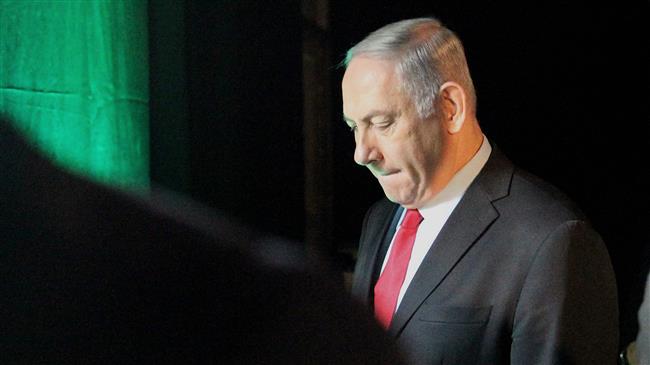Israel: Netanyahu facing fight for political future
Facing likely criminal charges and embroiled in a fierce dispute with a former protégé that has thwarted his attempt to form a new government, Israel’s Benjamin Netanyahu is facing perhaps the perhaps the biggest threat yet to his political future.
The day before, Israel’s lawmakers voted to dissolve parliament and trigger elections for the second time this year after Netanyahu failed to form a coalition, plunging the country into political uncertainty.
Just weeks earlier, the stage had been set for Netanyahu to form his fifth government and extend his already decade-long unbroken spell as Israel’s prime minister after his Likud party came out on top in an April 9 legislative election.
But a clash with a likely coalition partner, the far-right secular Yisrael Beiteinu party led by one-time Netanyahu aide Avigdor Lieberman, left him unable to cobble together a parliamentary majority.
Netanyahu has hinted he has no plans to hand over party leadership before the new vote – one that he could well win – but his spat with Lieberman, coupled with his efforts to avoid facing corruption charges, could leave him in much the same situation once the polls close as now: too short of political allies to form a coalition and return him to power.
Lieberman: ally tuned foe becomes kingmaker
Ostensibly at least, the clash between Netanyahu and Lieberman was over whether ultra-Orthodox Jews should be required to do military service.
Netanyahu, keen to appease the ultra-Orthodox Jewish coalition partners, has backed a draft law which would renew an exemption. Lieberman, whose party has courted the secular vote, has refused to fall in line.
“It’s just unbelievable, completely unbelievable,” a fuming Netanyahu told reporters Thursday. “It is perfectly clear that he [Lieberman] wanted to topple this government … to cobble together a few more votes.”
It was a new low in relations between the two men, who have experienced their fair share of ups and downs over the years.
Lieberman, a 60-year-old former nightclub bouncer, got his start in Israeli politics as an aide to Netanyahu during his first term as prime minister in the 90s, before promptly resigning in protest at what he saw as an overly lenient stance towards Palestinians and started his own party, Yisrael Beiten.
Nevertheless, he continued to be a useful if volatile ally to Netanyahu, serving in top posts in the latter’s governments including as foreign minister and defence minister, while also proving the source of numerous controversies, including when he referred to Israeli Arab lawmakers as terrorist “collaborators”, calling for them to face the death penalty.
He finally quit as defence minister last year, accusing Netanyahu of not being tough enough on Gaza militants.
Lieberman has hit back at his former boss, accusing him of seeking to establish “a cult of personality”.
For some observers, Lieberman is playing an astute political game, looking to take advantage of Netanyahu’s weakened position and use his power as de facto kingmaker to pursue an even bigger reward.
“Lieberman played the game. He probably didn’t want to negotiate,” Gil Mihaely, political commentator and editor-in-chief of France’s Causeur magazine told FRANCE 24’s The Debate programme.
By taking a stand over the military service draft law, Lieberman is hoping for a boost in the polls in Israel’s new elections, suspects Mihaely.
“Lieberman will try to convince the non-religious right and anti-religious centre that he is a man of principles and that he can be the next leader of the Israeli right and the next prime minister.”
Legal troubles
Liebermann still has a long way to go to claim power for himself, if that is indeed his intent, with his party securing only five seats in the 120-seat Knesset in the April vote. But that the leader of a relatively minor party has found himself in such a position of influence is down partly to another dark cloud hanging over Netanyahu – his legal troubles.
The prime minister is a suspect in three graft cases and Israel’s attorney general already has recommended that he be charged with bribery and fraud, subject to a hearing scheduled in October. Netanyahu has denied wrongdoing.
In response, his Likud party has pledged to pass legislation granting parliamentary immunity from prosecution for him while Netanyahu is in office, while also annulling any Supreme Court ruling rescinding that immunity.
It was this controversial policy that prevented Netanyahu from being able to form a collation with more centrist parties and made him so reliant on Lieberman – a weakness Lieberman has been able to exploit, according to Mihaely.
“He could have had at least two or three different governments, but he was locked in (to partnering with Lieberman) because he asked them to vote for the immunity law. This is why he didn’t have an alternative coalition. Liebermann understood that that is his weakness, that he couldn’t have a unity government with the left.”
The end for Netanyahu?
All this means that, barring a drastically different result in September’s election to the one just gone, Netanyahu is likely to face the same, possibly insurmountable challenges, to forming a coalition next time around, leading some to wonder if the man who has dominated Israeli politics for so many years his nearing the end of the road.
“The prevailing feeling among the Likud leadership after the past week’s upheaval is that Netanyahu is at the end of his political career,” wrote political analyst Shalom Yerushalmi in the Times of Israel.
“The blow to his morale, the public criticism, his shaken status … is all a sign that the game is lost, they argue.”
For now though, Netanyahu, a political survivor who has overcome predictions of imminent downfalls in the past, has shown no signs of throwing in the towel ahead of the upcoming vote.
“We will win,” he declared to reporters Thursday.
Culled from France 24





